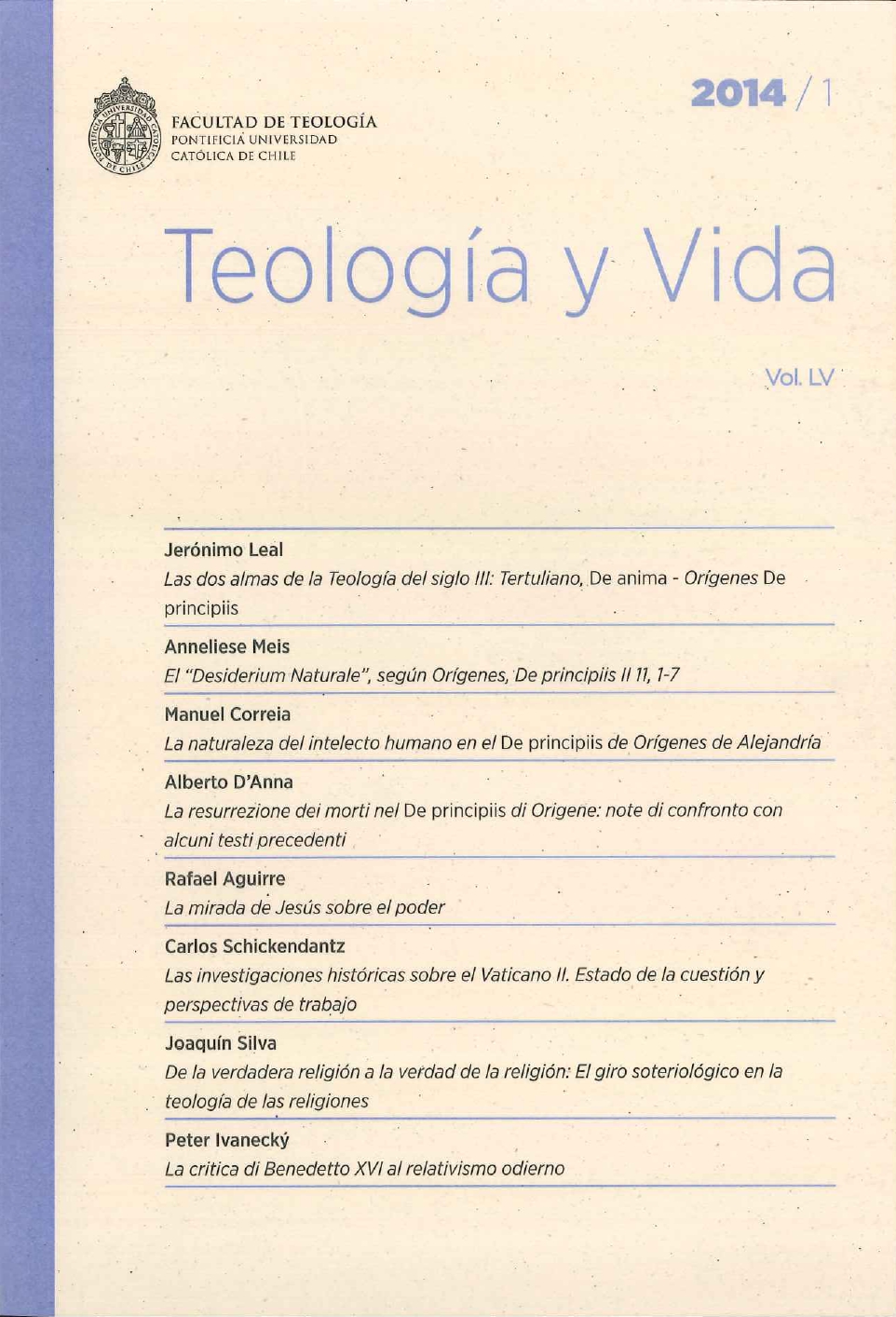Las dos almas de la Teología del siglo III: Tertuliano, De anima - Orígenes De principiis
Contenido principal del artículo
Resumen
Resumen: El objetivo de este estudio es mostrar las similitudes y diferencias entre Orígenes y Tertuliano en ámbito de la doctrina sobre el alma. En primer lugar, trata sobre la definición de alma en ambos autores. En Orígenes la terminología es de origen estoico, en Tertuliano, en cambio, la definición es una reconstrucción arbitraria a partir de elementos platónicos. Después, se pasa a algunos aspectos particulares de la antropología, como son el origen y naturaleza del alma, la responsabilidad moral de esta y el problema de las almas separadas. En los dos autores se da una misma explicación etimológica acerca del nombre del alma, recogida de la tradición filosófica. Tertuliano enlaza esta etimología con la narración del Génesis. Orígenes discute sobre dos alternativas acerca del momento de la unión de alma y cuerpo. Tertuliano y Orígenes emplean dos hipótesis alternativas para explicar el mismo problema: la trasmisión de la culpa originaria se puede garantizar sea por la preexistencia de las almas (Orígenes), sea por el traducianismo (Tertuliano). En Tertuliano la corporalidad constituye un sinónimo de realidad y sustancialidad; Orígenes atribuye también una cierta corporeidad al alma. La libertad, en Orígenes, es algo evidente, una lucha entre las fuerzas de bien y del mal ante las que se encuentra el alma; también en Tertuliano el alma tiene libre potestad de arbitrio que es inherente al hombre de modo natural; pero mientras Orígenes parece poner el alma ante dos posibilidades, entre las que elige libremente, Tertuliano afirma que es naturalmente buena, aunque tentada por el "irrationale". En ambos autores se afirma la inmortalidad del alma, pero en Orígenes hay una conexión entre inmortalidad e imagen-semejanza, mientras que en Tertuliano no la hay. En ambos casos vamos a encontrar también que una de las características del alma se transfiere al cuerpo con la resurrección: la espiritualidad. Sin embargo, para Orígenes, el cuerpo no se destruye, como en Tertuliano, sino que se transforma por mérito del alma, que viene a ser entonces responsable del pecado.
Palabras clave : Antropología; alma; Tertuliano; Orígenes; preexistencia; traducianismo; resurrección.
Abstract: The aim of this study is to show the similarities and differences between Origen and Tertullian in the field of doctrine on the soul. First, it deals with the definition of soul in both authors. In Origins the terminology is of stoic origin, in Tertullian, on the other hand, the definition is an arbitrary reconstruction from Platonic elements. Then we move on to some particular aspects of anthropology, such as the origin and nature of the soul, the moral responsibility of the soul, and the problem of separated souls. In both authors there is the same etymological explanation about the name of the soul, taken from the philosophical tradition. Tertullian links this etymology with the narration of Genesis. Origen discusses two alternatives about the moment of the union of soul and body. Tertullian and Origen use two alternative hypotheses to explain the same problem: the transmission of the original guilt can be guaranteed either by the pre-existence of souls (Origen) or by translationism (Tertullian). In Tertullian the corporeality constitutes a synonym of reality and substantiality; Origen also attributes a certain corporeality to the soul. Freedom, in Origen, is something evident, a struggle between the forces of good and evil before which the soul finds itself; also in Tertullian the soul has free power of choice which is inherent to man in a natural way; but while Origen seems to put the soul before two possibilities, among which he chooses freely, Tertullian affirms that it is naturally good, although tempted by the "irrationale". In both authors the immortality of the soul is affirmed, but in Origen there is a connection between immortality and image-similarity, while in Tertullian there is no such connection. In both cases we will also find that one of the characteristics of the soul is transferred to the body with the resurrection: spirituality. However, for Origen, the body is not destroyed, as in Tertullian, but is transformed by merit of the soul, which then becomes responsible for sin.
Keywords: Anthropology; soul; Tertullian; Origen; pre-existence; translation; resurrection.
Descargas
Detalles del artículo
Los autores de artículos aceptados en Teología y Vida conservan los derechos de propiedad intelectual sobre sus trabajos y otorgan a la revista los permisos de distribución y comunicación pública de los mismos, consintiendo que se publiquen bajo una licencia Creative Commons (BY-NC-ND) 4.0 Internacional, que se otorga por todo el plazo de protección de la obra y con un carácter no exclusivo. La única limitación para el autor es que sólo podrá otorgar licencias no exclusivas sobre su obra. Esta licencia no permite la generación de obras derivadas ni hacer un uso comercial de la obra original, es decir, sólo son posibles los usos y finalidad que no tengan carácter comercial.
Se recomienda a los autores publicar su trabajo en Internet (por ejemplo en páginas institucionales o personales, repositorios, etc.) respetando las condiciones de esta licencia y citando debidamente la fuente original.

